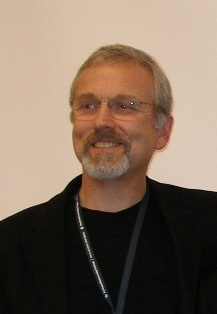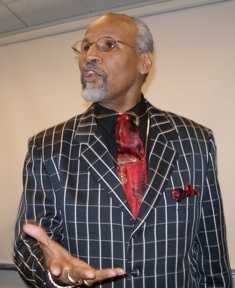Back in 1992, little more than year into Portland's experiment with "community policing" Officer Wayne Kuechler said the transition was proving hard for many of the Bureau's entrenched interests.
"It has become apparent that the most difficult part is changing the way officers approach their jobs," Kuechler wrote in the 1992 edition of "Footprints: The Community Policing Newsletter." "The officers who have put the philosophy and the training into action have accepted the idea that what they are doing now is more like the original intent of law enforcement."
Portland was the first major city to create a department-wide community policing strategy, according to Kuechler's article. Today, there are remnants left of that philosophy, although some experts say the  notion of an officer that works and lives in the neighborhood they serve has been lost in an era of increasing use of paramilitary tactics (Please see next week's edition for Part Two of this series).
notion of an officer that works and lives in the neighborhood they serve has been lost in an era of increasing use of paramilitary tactics (Please see next week's edition for Part Two of this series).
As Kuechler, who is now a sergeant in the bureau, found in his article, there were many individual officers willing to undertake a more involved form of policing – getting out of the car, walking the beat, getting to know people in the neighborhood they patrolled – but many were stalwarts for business as usual.
"The longstanding police culture that exists within law enforcement agencies often focuses on the failures of Community Policing rather than the successes, and conflicts develop," he wrote. "These may even take the form of teasing, direct ridicule, and group exclusion."
After 20 years, Portland's Police Bureau does not train specifically for community policing, says Det. Mary Wheat, the bureau's public information officer.
"(But) It's something that we continue to do," she said.
To Wheat, community policing is a strategy practiced by many of the bureau's officers. It's about getting out of the squad car, walking the beat, knowing people in the neighborhood and being accessible to people.
The work of the Neighborhood Response Team -- those officers who do not respond to 911 calls – is the bureau's main face for community policing, says Wheat. NRT officers attend community meetings, make themselves visible at the local coffee shop and work on specific neighborhood complaints. They work closely with detectives and end up writing a lot of search warrants to dislodge drug houses, prostitution hot spots and problem establishments. Much of this investigation work is done with the help of information obtained from citizens. All three precincts house a separate Neighborhood Response Team, says Sgt. Greg Stewart. Each precinct commander has a wide discretion of how their team of six to nine officers is used.
Is Community Policing Dead in Practice?
 Recent actions by individual officers call into question whether the bureau needs to do more to create officers to whom the average citizen can relate. Officer Ron Frashour, after shooting and killing the unarmed Aaron Campbell in January, was reassigned to the Neighborhood Response Team – the city's only dedicated unit of community police officers.
Recent actions by individual officers call into question whether the bureau needs to do more to create officers to whom the average citizen can relate. Officer Ron Frashour, after shooting and killing the unarmed Aaron Campbell in January, was reassigned to the Neighborhood Response Team – the city's only dedicated unit of community police officers.
And the case of PCC Student Delease Carter, who was thrown violently to the ground during what during what her lawyers say was an illegal search after being stopped for walking in the street at night, calls into question the tactics of a gang enforcement team that profile youth of color in Northeast Portland. Carter has since filed a tort claim against the city
| Aaron Olson |
Aaron Olson, a 26-year veteran with the Oregon State Police and criminal justice instructor at Portland Community College, says police departments need accountability and real internal discipline before a philosophy like community policing can take root the bureau.
In the case of Campbell, the police failed, Olson says. Olson – who is the co-author of "Multicultural Law Enforcement" -- said their training has taken a "quantum leap" in what qualifies for the use of deadly force.
"Thinking there's a weapon isn't the same as seeing," he said.
The totality of force used by officers at the scene was also both uncalled for and counterproductive, according to Olson. The use of pain weapons – such as the bean bag round used on Campbell – are largely ineffective when someone is having a psychotic episode, he said. Those same people are also more likely to behave in an irrational way.
Olson says the "comedy of errors" that has occurred at the bureau is not a number of isolated incidents.
"What's going on with the Portland Police Bureau is a cancer and it is malignant," he said.
Olson calls on two fixes for the Bureau: requiring annual performance reviews and mandating all officers learn the techniques of Verbal Judo, a martial art of mind and mouth that helps people diffuse contentious situations through persuasive conversation and psychology.
Without annual performance reviews, Olson says rogue behavior is never evaluated and is allowed to "catapult."
"With what's going on, they're not practicing community policing on the streets," Olson said. "Police do good things and police do bad things."

| A.L. 'Skip' Osborne |
A.L. "Skip" Osborne, president of Truth and Justice for All, says if Portland police were actually practicing the philosophy of community policing, there could be a change in the opinion of the community.
"There would not be such a lack of trust with people of color," Osborne said.
A group of citizens called "(I'm) Everyday People" are pressuring elected officials to pass a modified version of Senate Bill 111 – "Aaron Campbell's Law." The group met on Wednesday in private to discuss changes to the bill, which organizes law enforcement agencies to plan and implement use of force policies.
Derry Jackson, an organizing member of Everyday People says the group has yet to decide on a full list of reforms, but he said they will be focusing on the repeal of the "Force Continuum" which currently doesn't take into account people suffering from psychotic episodes. Contact them at [email protected].
Osborne says a very important community policing principal is for the men in blue and the community to come to a consensus on the values that guide the force.
"By virtue of the authority that 'we the people' vest in them, police have overarching responsibility for the outcome of encounters with citizens," he said. "Good policing must take into consideration two equally important factors: the values on which a police department operates, as well as the practices it follows."














































































































































































































































































































